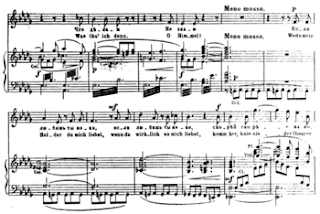I just found on Miguel's Facebook page this video clip (courtesy of friend and "friend" David R.) of Heart doing a cover tribute to Led Zeppelin last year at the Kennedy Center, three of the remaining Zeppelin members in attendance as guests of honor. It's always unnerving, when referring to the members of bands from my own era, to be under the necessity of employing "remaining" or "surviving" as a qualifier. No such necessity arises when referring to Beethoven or Mozart of course, but everyone knows what the choice of a musical career did to them. Nonetheless, this is well worth a listen, if only as a setting for the ensuing profundities.
Watching this video reminded me of an argument I heard from one of my professors during my youthful academic beginnings at some backwater version of the Sorbonne (a professor, incidentally, who soon went on to greater vistas than my recalcitrant improvement through philosophical instruction). He insisted, and was writing a plausible book to establish his argument, that a thing like a musical performance is a performance of something. That is, it's a performance of some thing which is not the same as the performance of the thing. So Heart can do a bang-up performance of "Stairway to Heaven," just as Led Zeppelin did 40-odd years ago, but what they're performing is the same thing, namely the song, "Stairway to Heaven."
Well, seems obvious. But not so fast, Trismegistus. What exactly is a song such that it can be, and remain, the same thing over those 40-odd years? What sort of thing is it, anyway? Is it the entire set of performances to date? But those can be added to. Is it an idea which those musicians share? But some can get it badly wrong, and is that the same idea? What this actually raises is the medieval debate between the nominalists and the realists, the linguistic sceptics and the neoplatonists.
"Hmmmph . . . I'll show you, or some instantiation of you."
The nominalists maintained that "Stairway to Heaven" is merely a name which refers to no particular thing, but signifies only the various particular instances or occurrences of "Stairway" (performances, bundles of sheet music, individual recordings on records or CD's, someone's humming of a tune) which happen to resemble one another in important, defining ways. Perhaps in essential ways, and those individual instances we assign a tag or name to. Flatus vocus, such names are mere empty breath, devoid of reference, signifying only because we all agree (usually less rather than more precisely) what they mean. The universe is made of discrete particular things and we join them only by the conventions of linguistic meaning.
Aha, responded the realists (and my professor), instances or occurrences of what, exactly? And in ways essential to . . . exactly which thing, prithee? The realists' world consists in universals, ideas to which words make reference. Heart doing a cover of "Stairway" is not the same as "Stairway," which is an ideal thing of which Heart's performance is one particular instance. The name refers to a real thing, which is not merely the collection of all its instances in the world.
Real or imagined?
My professor landed squarely on the side of the Platonists. The performances of a musical work (he always used Beethoven's Ninth Symphony as an example, but "Stairway to Heaven" will more than suffice for the argument) are performances of something, and the thing they are performances of is separate from the class of all performances of that thing. It is a thing that exists independently of its performances - in short, one of Plato's ideas.
It's more than I can say, who may be right. But listening to that video nudges me into the Platonists' camp. It seems a thing that transcends Robert Plant and the Wilson Sisters, Led Zeppelin and Heart. It has its own life, and any artist can only aspire to get it right. Once would be enough.


No comments:
Post a Comment